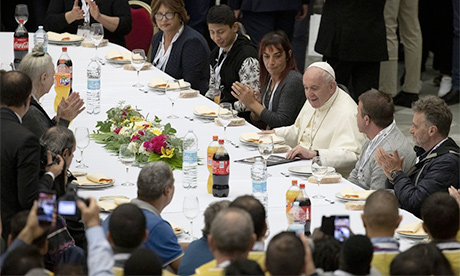Pope Francis, Sunday, marked the Church’s World Day of the Poor by hosting 1,500 homeless and disadvantaged people for lunch.
The menu included lasagna, chicken in a cream of mushroom sauce, potatoes, sweets, fruit and coffee.
Some 150 tables were set up in a Vatican hall where Francis normally holds his weekly indoor audiences with the public.
Another 1,500 were treated to a similar lunch elsewhere in Rome, and parishes throughout the diocese were similarly serving lunch for those who were unable to afford their own.
Lunch follows on from a week of free medical clinics set up in St Peter’s Square where volunteer doctors give the homeless and disadvantaged free specialist health care.
General care is available year-round nearby, another of Francis’ initiatives.
Also, on Friday, Francis opened a new place for the homeless on the doorstep of the Vatican.
Just a few metres away from the colonnade of St Peter’s Square, the building occupies an entire four-storey building owned by the Vatican.
Up until a few months back, the building, Palazzo Migliori was used by a female religious congregation.
Transferred to the Papal Almoner – Polish Cardinal Konrad Krajewski, it now has a second life.
“It is the name of the family that owned it before 1930 and sold it to the Vatican, but it also translates in Italian to ‘the Palace of the Best’ – and indeed considering who will stay here, it is exactly the case”, Krajewski told Crux.
With historic wooden ceilings, pieces of art on the walls and now equipped with an elevator, inside it is nothing like homeless shelter.
“I asked a construction company to let the homeless workers do the renovation.
“They agreed a bit hesitantly but then they were so happy with their work, they decided to hire those people – the owner of the company said they rarely see people who would work so hard”, said Krajewski.
Marking the World Day of the Poor at Mass in St Peter’s Basilica, Francis lamented the lack of concern about the growing gap between the have’s and have nots.
Dismayed over society’s indifference towards poor people, Francis said that the ‘greed of a few’ is compounding the plight of the poor.
“We go our way in haste, without worrying that gaps are increasing, that the greed of a few is adding to the poverty of many others,” he said.
These moves, a mark of his papacy, are not without criticism.
Francis’ emphasis on mercy and charity is raising the ire of a small but noisy faction, among them, more conservative bishops and cardinals who would rather the pope concentrate of dogma and matters of faith rather than social issues.
Sources
